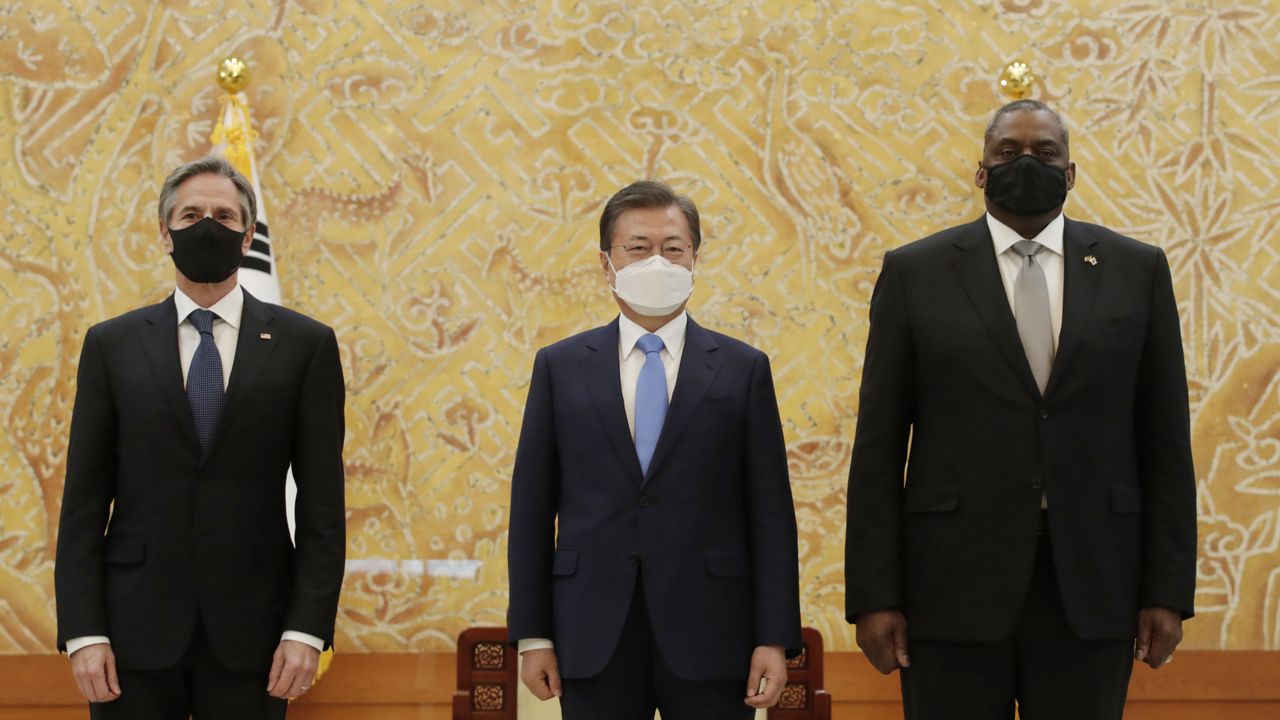Top U.S. officials set off on the first Cabinet-level, overseas trip of the Biden administration this week, heading to Japan and South Korea to strengthen cooperation with the two Indo-Pacific allies.
In a letter penned in the Washington Post ahead of the trip, Defense Secretary Lloyd Austin and Secretary of State Tony Blinken said the trip signified the reemergence of the United States into the global sphere. The administration is “now making a big push to revitalize our ties with friends and partners — both in one-to-one relationships and in multilateral institutions — and to recommit to our shared goals, values and responsibilities,” the letter read in part.
Japan and South Korea are particularly vital partners for the United States, Austin and Blinken wrote, saying the three countries have long worked together on key issues including nuclear threats from North Korea, supporting democratic values, and ensuring a free and open economy in the Indo-Pacific region.
China and North Korea emerged as top issues for all three countries over the course of the week, previewing an anticipated meeting on Thursday when top officials from the U.S. and China are set to meet in Alaska.
The two men touched down in Japan on Monday, where they were greeted by Foreign Minister Toshimitsu Motegi and Defense Minister Nobuo Kishi, later meeting with Prime Minister Yoshihide Suga.
The issue of China and how to confront its "coarsening" behavior was among the primary topics of the meetings between the United States and Japan. According to a report from the Department of Defense, Japan is concerned about China’s “aggressive actions in the Taiwan Strait,” a small waterway separating mainland China from Hong Kong.
Beijing claims full autonomy over Taiwan, and Blinken condemned China for attempting to undercut democracy in the smaller nation.
“We're united in the vision of a free and open Indo-Pacific region where countries follow the rules, cooperate whenever they can, and resolve their differences peacefully," Blinken said. "We will push back, if necessary, when China uses coercion and aggressions, to get its way."
In a joint statement released after the talks, the ministers shared strong worry over Beijing’s human rights violations in Xinjiang, “unlawful maritime claims and activities in the South China Sea” and “unilateral action that seeks to change the status quo” over the Japan-controlled East China Sea islands that China also claims. The statement also stressed the importance of “peace and stability” in the Taiwan Strait.
China on Wednesday said the U.S.-Japan statement “maliciously attacked” its foreign policy and seriously interfered in China’s internal affairs. Foreign Ministry spokesperson Zhao Lijian said China was “strongly dissatisfied and resolutely opposed” to the statement.
In addition to meeting with government leaders in Japan, Blinken virtually met with female Japanese entrepreneurs, saying the women have “a critical role to play in building dynamic, innovative economies that create opportunities for people.”
Blinken and Austin traveled to South Korea on Wednesday, with the focus of those talks being North Korea and its nuclear ambitions.
“The authoritarian regime in North Korea continues to commit systematic and widespread abuses against its own people,” Blinken said at the start of his meeting with South Korean Foreign Minister Chung Eui-yong. “We must stand with people demanding their fundamental rights and freedoms and against those who repress them.”
Blinken called North Korea’s nuclear and missile programs “a threat to the region and to the world.” He said the United States will work with South Korea, Japan and other allies to achieve the denuclearization of North Korea.’
Blinken also went on to press China to use its “tremendous influence” to convince North Korea to abandon its nuclear program, hours after the North said it will ignore U.S. offers to resume negotiations.
When Austin separately met his South Korean counterpart Suh Wook on Wednesday, he said their countries’ alliance “has never been more important” given “the unprecedented challenges posed by” North Korea and China.
The two top U.S. officials held a joint “two plus two” meeting with Chung and Suh on Thursday in the first such contact between the two countries in five years.
With officials from China voicing their displeasure with aspects of the U.S. trip, a scheduled meeting in Alaska will likely highlight the increasing tensions between the two countries.
Blinken and Jake Sullivan, President Joe Biden’s national security adviser, are set to meet with China’s top two diplomats, State Councilor Wang Yi and Chinese Communist Party foreign affairs chief Yang Jiechi, in Anchorage on Thursday.
Difficult discussions are anticipated over trade, human rights in Tibet, Hong Kong and China’s western Xinjiang region as well as Taiwan, China’s assertiveness in the South China Sea and the coronavirus pandemic. No agreements are expected and the White House framed it as an initial chance to address intense disagreements.
“I would simply say that this meeting is not part of a series of meetings at this point in time," White House press secretary Jen Psaki said of the planned meeting during Thursday’s press briefing.



